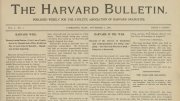Family histories are often passed down by word of mouth—imperfect, fleeting, and fragmented. A memory shared at the dinner table, a story retold at a holiday gathering, a name recalled in passing. But what if these moments could be captured, preserved, and revisited—not just as written words, but in the voices of those who lived them? In February, Charlie Greene, M.B.A. ‘21, stepped onto the set of ABC’s Shark Tank to pitch Remento, the startup he launched after graduating from Harvard Business School (HBS) to turn this vision into reality. The episode airs March 7 at 8 p.m. Eastern / 7 p.m. Central on ABC.
Greene’s fascination with memory began in childhood. He loved cameras, often recording home videos of everyday life with his father, who had a knack for storytelling. But when his father passed away shortly after Greene’s tenth birthday, those recordings became more than just keepsakes: they were portals to a voice, a presence, and a personality that might have otherwise faded. One clip stands out: “Just my father, at the breakfast table, eating a bagel and explaining something between bites before heading off,” Greene shares. It’s a simple yet incredibly special moment. Years later, it’s enough to bring him back to the cadence of his father’s voice, his gestures mid-sentence, and the rhythms of a long-ago morning at home.
When his mother was diagnosed with stage 3 lung cancer in 2017, Greene was determined not to lose her voice in the same way he had lost his father’s—a man who he never had the chance to fully get to know. So, he conducted an oral history interview. What emerged was more than he anticipated: anecdotes he’d never heard and reflections that deepened his understanding of his mother as a woman, a professional, and more importantly, as a self separate from all these things. “Why had it taken a crisis for this conversation to happen?” Greene asks. That question lingered, even after her recovery.
Greene arrived at HBS in 2019. His classes changed shape very abruptly when the COVID-19 pandemic erupted. As conversations between classmates, friends, and family members became awkward, strained, and limited, Greene began exploring how technology could be used to bridge the gaps—not through scattered texts or social media posts, but through something closer to the oral traditions of preserving history that go back centuries.
He enrolled in Launching Tech Ventures, a course taught by senior lecturer of business administration Jeffrey Bussgang that focused on the challenges early-stage startups face. The class placed a heavy emphasis on artificial intelligence and examined technology-based ventures still searching for product-market fit. “Our cases focused on founder decisions during the discovery phase, especially in designing experiments to test their concepts,” Greene recalls. The course provided a framework for thinking through the complexities of building a technology-driven service, exactly when these ideas were circulating for Greene outside the classroom.
The challenge, he realized, wasn’t just to make the recording process easier, but to guide people to tell their stories in a way that felt natural and meaningful. If AI could be applied to improve efficiency in sectors like e-commerce and software, why couldn’t it be used in other ways? Greene secured initial funding from Upfront Ventures in 2021 and launched Remento (a portmanteau of “remember” and “memento”) the same year.
The platform doesn’t aim to replace storytelling—a fear leveled against the use of AI in writing. Instead, it aims to facilitate it. Users receive weekly memory prompts via email or text, encouraging them to record their reflections. These recordings are then transcribed using AI and compiled into hardcover books. Inside the books, readers can find and scan QR codes to hear the original voices behind the words—including the laughter, hesitation, and quirks of someone’s speech that text can’t encode. These transcribed recordings are also stored in a digital archive, ensuring that family stories remain accessible for future generations.
For Greene, Remento is less about the technology and more about preserving connections. “It’s a way to ensure that my own children won’t have to rely on faded photographs or fragmented recollections to know their relatives,” he says. Instead, they’ll grow up surrounded by their voices and stories—something tangible, something lasting. The act of remembrance is as old as history itself. In post-medieval Europe, aristocratic families commissioned elaborate painted family trees, adorned with heraldic symbols, as a way to document lineage and legacy. In a way, Remento reimagines this tradition for the digital age: not as static paintings, but as living archives, and evolving collections of voices and memories that might otherwise be lost to time.
Greene didn’t set out to build a business—he just wanted to solve a problem that had been quietly shaping his life for years. And in doing so, he created something that might help others hold onto the voices that matter most.









